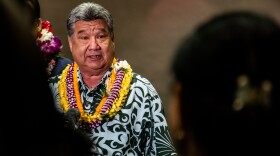A new coffee labeling law is set to become effective next month, but a shortage of state Department of Agriculture inspectors could make that a difficult task.
Lawmakers last year passed Senate Bill 746, expanding coffee labeling requirements to protect local farmers and consumers. Coffee with labels claiming it was grown or processed in Hawaiʻi must use 100% local coffee, or list how much of it is from out-of-state.
The measure gave companies a year to properly label their coffee, and will go into effect on July 1.
But Rep. Jeanne Kapela, who represents Hawaiʻi Island and authored the companion bill to SB746, recently issued a press release about her concerns that there still isn’t any compliance.
“I had gotten a couple of calls from local farmers saying, 'This is supposed to go into effect and we're super excited about it.' But nothing's changed. You walk into the grocery store and it's all the same,” she said.
Enforcement is the responsibility of the DOA’s Quality Assurance Division. But as of mid-June, the division has only two inspectors statewide to do that work.
There are six available inspector positions, but one is on medical leave. The late 2000s recession shrunk the budget for the inspectors, and the position’s low pay has made it difficult to fill in the vacant spots that are still being funded.
The active inspectors also already have a full workload, according to division administrator Leo Obaldo.
They don’t just police labeling laws, but also monitor commercial measuring devices. Obaldo said much of their work is making sure the meters at gas pumps and taxis are accurate.
“Right now, what we do with it is, we still address it, but it's more of a passive kind of enforcement. We call it 'complaint-driven' enforcement, where if there's a complaint, we investigate it, we want to know what’s going on,” Obaldo said.
But following Kapela’s concerns, he said one of the inspectors will start doing more spot checks on coffee labels.
“We want to make sure the business that is being subject to the complaint will be informed about the violation, and we would require corrective action,” Obaldo said.
Kapela said the lack of enforcement means the state needs to do a better job of funding and supporting the agriculture department, which gets just a fraction of a percent of the state’s overall budget.
“If the department really doesn't have the money — which we know that they don't because the state has starved them and their budget as a whole — we have to have something simple where the public can get involved in enforcement and we can,” Kapela said.
Another substantial coffee labeling bill, Senate Bill 2298, moved out of the state Legislature this year. If that bill becomes law, it would require coffee labeled as being sold or processed in Hawaiʻi to have more than 50% of its contents locally sourced.
Obaldo said enforcing that law, which would go into effect in the summer of 2027, would be even more involved because the actual contents of coffee drinks or packages would have to be tested.







